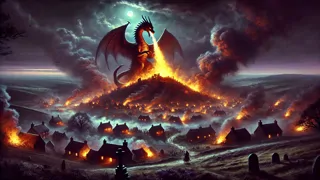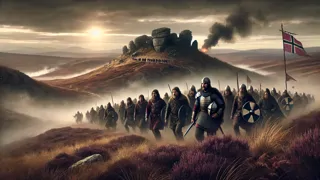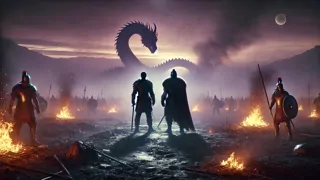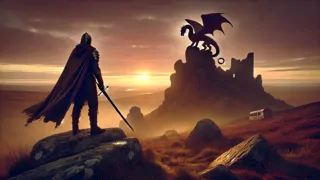Introduction
When the wind sweeps across the wild moors of ancient Britain, it carries echoes of tales woven into the very bones of the land—stories of valor, glory, and the steep price of greatness. Among these, none burn brighter than the legend of Beowulf, whose name is still uttered in reverence around glowing hearths and beneath the vaulted roofs of old halls. Time had silvered his beard and deepened the furrows in his brow, but Beowulf’s spirit, once tempered in the crucible of youth, remained unbowed. He was no longer the brash warrior who had slain Grendel and his dam; he was a king now, a shield for his people, a living relic from a fading era when heroes shaped the fate of kingdoms with their bare hands. Yet, destiny’s hand is never idle. In the golden twilight of Beowulf’s reign, a disturbance rippled through the peaceful Geatish lands—a disturbance born not of mortal scheming, but from the depths of the earth, where ancient greed slumbers on beds of hoarded gold. A slave, driven by desperation, crept into the barrow of a dragon and stole a jeweled cup, rousing the monster’s fury. Fire and ruin soon followed, and the dragon’s wrath threatened to consume everything Beowulf had built. The people looked to their aged king, knowing that only the man who had once defied monsters could stand against this new terror. The air grew thick with apprehension as Beowulf donned his iron mail once more, resolved to face the dragon himself, though age had dulled his strength and left his body aching with the memories of old wounds. In the gathering dusk, as the last rays of sun turned the world to gold, Beowulf understood that this would be his final trial. Not for riches or renown, but for love—love for his people, for the legacy of courage, for the honor that could not be surrendered to time or flame. Thus begins the final act of Beowulf’s life, a tale of heroism and sacrifice that would echo in the hearts of generations yet unborn.
The Dragon’s Awakening
The land of the Geats had known peace for many years under Beowulf’s wise rule. Villages flourished, children played without fear in the meadows, and the king’s hall rang with laughter and song. But beneath the rolling hills, deep in the barrow of Earnaness, slept a creature as old as the land itself—a dragon, vast and terrible, whose coils wound around a mound of treasure gathered over centuries. The dragon’s slumber was heavy and dreamless, guarded by enchantments that kept mortals at bay. Yet nothing crafted by human hands or the passage of centuries could shield this hoard from the desperate.

It began with a single act of folly. A runaway slave, trembling from hunger and dread, stumbled into the dragon’s lair while seeking refuge from his master’s wrath. The flickering light from his stolen torch caught the gleam of golden goblets and encrusted plates, the bones of thieves long dead strewn among the riches. In his terror, the slave seized a jeweled cup and fled into the night, believing the world outside less deadly than the depths he left behind.
The dragon awoke to the theft with a fury born of ancient instinct. Its eyes, burning like twin embers, swept over the violated chamber. The scent of man—sharp, acrid, and unforgivable—hung in the stagnant air. With a roar that shook the earth, the dragon surged from its lair, trailing smoke and flame. Its wings cast monstrous shadows over the fields as it soared into the sky, raining fire on the villages below. That night, every roof in Earnaness glowed red, and the terrified Geats huddled together, watching their world burn.
Word reached Beowulf in his hall as smoke rose on the horizon. He listened gravely to the accounts of loss: children orphaned, fields scorched, treasures reduced to ash. He was no stranger to sorrow, yet something in the villagers’ pleading eyes stoked a familiar fire in his chest. Though his hands trembled slightly with age, his resolve did not waver. He called for his shield-bearers, the loyal thanes who had followed him into darkness before. Among them was Wiglaf, the youngest and most steadfast, a boy with the glint of destiny in his gaze.
Beowulf addressed his men with a voice that resonated in the shadowed hall: “I do not seek this fight for glory or gold. The time for songs of youth is past. I will meet this dragon, not as a hero, but as a king who must stand for his people, even when fate turns against him. If I fall, let my deeds speak louder than my words.” The thanes, bound by loyalty, prepared for battle, though fear gnawed at the edges of their hearts. Yet none doubted the courage of their king, whose past victories seemed to shine all the brighter in this moment of darkness.
As night deepened, Beowulf gazed at the moonlit countryside, recalling his first battle with Grendel. He remembered the taste of fear, the weight of destiny, and the way legends are shaped in the crucible of choice. Now, he would forge his final legacy with the fires of resolve. The next dawn would see him walk toward the dragon’s lair, sword in hand, ready to face whatever doom awaited.
The March to Earnaness
The day after the dragon’s onslaught dawned cold and raw, as if the world itself mourned for the shattered peace. Beowulf summoned his thanes at first light, their faces ashen with exhaustion but set with grim determination. The king donned his ancestral armor—chainmail that had protected him in countless battles, its links dulled by time but strong as ever. Across his shoulders he draped a weathered cloak, the color of storm clouds, and fastened at his hip the sword Naegling, a blade said to be forged by giants.

The company set out from the royal hall, their numbers fewer than in Beowulf’s glory days but their hearts no less loyal. Wiglaf marched at Beowulf’s side, carrying a new shield—iron-banded and broad—crafted by the best smiths in Geatland. The path to Earnaness wound through moorland wild with heather and bracken, across streams still choked with ice. Along the way, villagers gathered in silent clusters, eyes shining with hope and dread as they watched their king pass. Some whispered prayers to old gods; others wept quietly, knowing what this journey likely meant.
As they drew closer to the barrow, the land bore fresh scars—blackened earth where dragonfire had passed, flocks scattered, and cattle bones bleached beneath an ashen sky. The dragon’s lair loomed ahead, a mound of turf and stone riddled with cracks that belched smoke and heat. The air was thick with the stench of scorched earth and charred flesh, and the ground trembled beneath their feet as the beast within stirred restlessly.
Beowulf paused at the edge of a ruined grove, his gaze sweeping over his companions. He spoke quietly, the weight of years in his words: “This is not a battle for the young or untested. I ask only those willing to face death beside me to continue. For this fight will be our last together, whatever fate decrees.” The thanes exchanged glances—some pale with fear, others flushed with determination. In the end, only Wiglaf stepped forward without hesitation, his loyalty burning brighter than fear. The rest fell back, guilt and sorrow etched on their faces.
Beowulf nodded, pride mingling with regret. He turned to Wiglaf and placed a hand on the young man’s shoulder. “You have the makings of a true hero, Wiglaf. Should I fall, let it be known that my faith in you was absolute.” The words hung in the cold air as Beowulf led Wiglaf toward the mouth of the barrow. Inside, the darkness pulsed with menace. The dragon’s breath echoed through the tunnels, a sound like distant thunder.
At the entrance, Beowulf raised his voice in challenge: “Creature of fire and greed! I am Beowulf, son of Ecgtheow, king of the Geats! Face me if you dare!” His words rang out, bold and defiant. There was a moment of silence, broken only by the hiss of steam as the dragon stirred. Then, with a roar that made the stones tremble, the dragon emerged, eyes blazing like twin suns. Its scales shimmered with every hue of gold and bronze, and smoke curled from its nostrils as it surveyed its challengers.
Beowulf tightened his grip on Naegling. He felt his heart hammer in his chest—a sensation both familiar and strangely comforting. He looked once at Wiglaf, then advanced, knowing that every step brought him closer to destiny’s final reckoning.
The Battle in Fire and Shadow
The dragon’s body blocked the barrow’s entrance, massive and sinuous, its eyes fixed on Beowulf with ancient malice. It uncoiled slowly, testing the air with its forked tongue, flames licking between razor teeth. The air grew stifling; every breath tasted of sulfur and fear. Beowulf raised his shield as the dragon let loose its first gout of fire, a torrent so fierce it fused sand to glass and set stones to steaming.

Beowulf charged, shield held high. The blast struck him full-force, yet he pressed forward, boots digging furrows into scorched earth. Naegling’s blade flashed, scoring a shallow cut on the dragon’s armored snout. The beast recoiled, more from surprise than pain, and smashed its tail in a sweeping arc. Beowulf was hurled aside, crashing against a boulder. He staggered to his feet, battered but undaunted, even as smoke curled from the edges of his shield.
Wiglaf rushed to his side, shield up, defiance etched on his young face. “We fight together, my king!” he shouted above the chaos. Beowulf nodded, grateful for the loyalty that survived fear. Together they advanced, circling the dragon. The monster’s tail lashed again, shattering stones and sending splinters flying. Wiglaf darted in, landing a glancing blow on the dragon’s flank. Enraged, the beast unleashed another torrent of fire. Beowulf shielded Wiglaf, his own armor glowing red from the heat.
The battle raged on, the air thick with flame and ash. The ground trembled under the dragon’s weight; each blow from its tail or claw was a force of nature. Beowulf’s arms shook with exhaustion, his breath coming in ragged gasps. Still he pressed on, each swing of Naegling driven by sheer will. At last, he found an opening—he plunged his sword deep into a softer patch beneath the dragon’s jaw. The beast screamed, blood black and smoking pouring from the wound.
But Naegling shattered with the force of the blow, its ancient blade splintering in Beowulf’s grasp. The dragon struck back with terrible fury, its claws raking Beowulf’s side. He fell to his knees, blood soaking his mail. Wiglaf leapt between them, slashing with his own sword. The dragon’s attention shifted, and it roared in pain as Wiglaf’s blade found another wound. The two warriors fought side by side, sweat and blood mingling in the heat.
With his last reserves of strength, Beowulf drew a dagger from his belt. Summoning every scrap of courage and memory, he hurled himself onto the dragon’s neck, driving the blade deep into its flesh. The dragon writhed in agony, its flames sputtering, until at last it crashed to the earth, its wings collapsing in a final shudder. Smoke drifted from its nostrils as its life ebbed away.
Beowulf slumped beside the corpse, mortally wounded but victorious. Wiglaf knelt at his side, tears streaking his soot-blackened face. In that moment, amid the ruin of battle and the cooling corpse of the dragon, an era ended—and a hero’s legend was sealed forever.
Conclusion
As the smoke faded and silence crept over Earnaness, Wiglaf cradled Beowulf in his arms beside the dragon’s cooling form. The old king’s breath was shallow, his lifeblood seeping into the scorched soil. Yet his eyes were clear, reflecting neither regret nor fear—only a fierce pride that outshone pain. In hushed tones, Beowulf entrusted Wiglaf with his final wishes: that the treasure be used not for personal gain, but for the good of their people, and that a great barrow be raised upon the headland so all who sailed by would remember the king who had faced death unflinching. Wiglaf promised, tears unashamed on his cheeks. Around them, dawn broke over the moors, bathing the world in soft gold. Word of Beowulf’s death spread swiftly; grief mingled with awe as Geats gathered to mourn their king. They honored his command, raising a mighty mound above the sea and burying him with treasures hard-won and dearly paid for. Minstrels wove songs of his deeds; children spoke his name with wonder. Yet above all lingered the lesson of his life: true greatness lies not in hoarded gold or fleeting triumphs, but in courage that endures even when hope is gone. Through sacrifice and loyalty, Beowulf passed from man to myth, his story echoing forever along the wind-swept shores and starlit skies of ancient Britain.


















